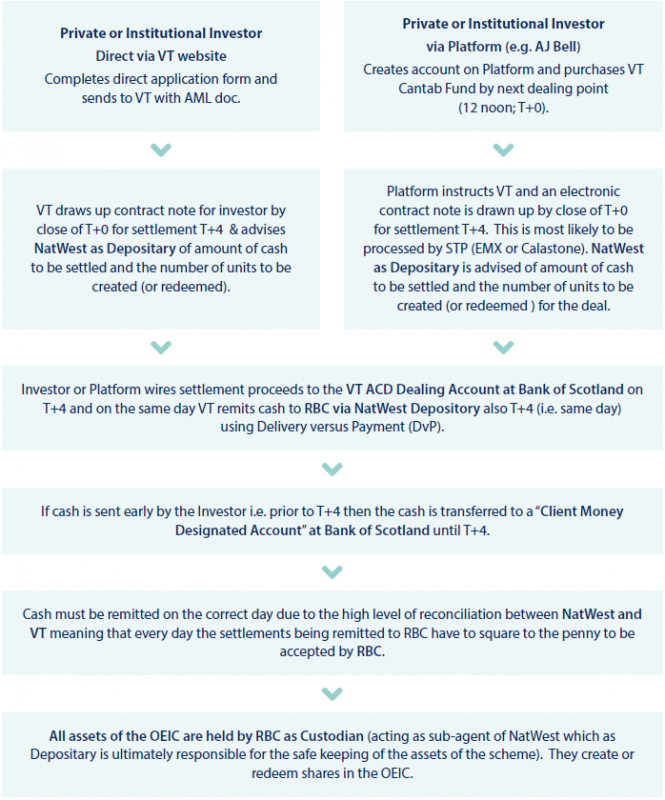
1 January 2023
What is an OEIC?
An Open-Ended Investment Company (‘OEIC’) is a collective investment vehicle that pools your money with other investors.
An OEIC is a company in its own right, so when you invest money in an OEIC you buy shares in that company. As OEICs are open-ended vehicles (unlike investment trusts), the OEIC will issue (or redeem) shares on a regular basis in response to investor demand. This will then increase or reduce the overall size of the fund accordingly.
The OEIC fund’s value is directly linked to the performance of its underlying financial assets – when their value increases, your shares grow in value too. Of course, if these financial assets go down in value then so too does the value of your shares.
As the OEIC pools money from several investors, this larger size allows the fund manager to invest in a far greater variety of financial assets (company shares, government or corporate debt or other types of financial investments in global markets) than would be available to an individual investor. Additionally, this greater size will allow for economies of scale in relation to the cost of investing in financial assets.
What is UCITS?
The UCITS (Undertakings for Collective Investments in Transferable Securities) Directive provides a single regulatory framework for an investment vehicle throughout the EU. The original Directive, ‘UCITS I’, introduced the concept in 1985. UCITS III, UCITS IV and UCITS V arrived in 2003, 2011 and 2014 respectively.
One of the key benefits of the UCITS Directive is that UCITS can be regulated in one EU member state and offered in others without the need for further authorisation by virtue of passporting rights. This also brought costs down for fund providers as it means they no longer had to create a new investment vehicle for each country in which they intended to market.
The UK is no longer part of the EU’s UCITS framework. However, the FCA has retained the UCITS rulebook for UK domiciled funds, thereby creating a category of fund known as UK UCITS.
When the UK left the EU on 31 January 2020, it entered into a transition period until 31 December 2020 during which the EU marketing passport regime was still applicable. However, since 1 January 2021, UK UCITS no longer have passporting rights into EU/EEA countries and the UK is now considered a third country to the EU. UK UCITS must now comply with national private placement regimes or apply to financial regulators in individual member states for the authorisation to sell/market to retail investors.
Eligible and non-eligible investments within the OEIC:
There are several rules governing what can and cannot be held in the Cantab OEIC.
- The OEIC can invest in: transferable securities, approved money-market instruments, deposits, derivatives and units in other collective investment schemes.
- The UCITS eligible assets Directive, which came into effect in July 2008, clarifies the definition of terms used in the Directive by setting out criteria for determining which types of transferable securities, approved money-market instruments and derivatives are eligible to be held by a UCITS.
- Within this range of investment assets there are some detailed spread and concentration rules in the Directive.
- The main requirements can be summarised as follows:
- no more than 5% may be invested in transferable securities or approved money-market instruments with one issuer – this can be raised to 10% but only in respect of a maximum of 40% of the UCITS value;
- no more than 20% may be invested in deposits with one body;
- 100% may be invested in other collective investment undertakings provided:
- no more than 30% is invested in total in units in collective investment undertakings which are not UCITS and then only in collective investment undertakings that offer equivalent protection to investors;
- the collective investment undertaking being invested into is not permitted to invest more than 10% in other collective investment undertakings; and
- no more than 10% is invested in any one UCITS (which may be raised to 20% at the discretion of the Member State and has been raised to 20% for UK UCITS), except where a feeder UCITS is investing in a master UCITS (see COLL 5.8 (Investment powers and borrowing limits for feeder UCITS)).
- no more than 20% may be invested in transferable securities and approved money-market instruments issued by one group;
- no more than 20% may be invested in any combination of transferable securities, approved money-market instruments, deposits, or OTC derivatives from a single body; and
- no more than 5% may be invested in OTC derivative exposure to one counterparty, or 10% where the counterparty is an approved bank.
- A UCITS may borrow up to 10% in value of its assets, provided the borrowing is on a temporary basis.
Why are there Inc and Acc units?
Many funds offer different types of unit. The two most common are income and accumulation.
With income units, investors will be paid any income the fund’s investments receive (like dividends from the companies in which the fund invests).
With accumulation units, the income is automatically reinvested into the fund. Investors do not receive an income payment – instead the income increases the price of each unit. Investors looking to grow their money in the long term usually buy accumulation units.
Dealing in Funds
Unlike shares, which are traded continuously when the stock market is open, funds are usually traded once a day.
Each fund has a daily ‘valuation point’, normally at 12 noon. At this time, the Authorised Corporate Director (ACD) works out the value per unit of the fund’s investments. This is the price at which units are bought and sold.
If you place an order to buy or sell a fund, it will go through at the next valuation point. This means you will not know the exact price beforehand.
Fund Taxation
UK open-ended investment companies (OEICs) and unit trusts receive UK dividends and pay dividend distributions without having to account for corporation tax. All other forms of income into the OEIC are subject to corporation tax at 20%. This could include interest, dividends from non UK companies and rental income.
Capital gains realised by the fund are exempt from tax.
Investor Taxation
Dividend Distributions
Dividend distributions are classed as taxable income, so you should declare the total amount received or earned to HM Revenue and Customs (HMRC). Depending on your personal circumstances you may have a liability to pay tax on some or all of the dividends received or earned. For details of the current dividend allowance, please visit www.gov.uk/tax-on-dividends.
Capital Gains
Unless you have invested via tax-free wrappers such as an Individual Savings Account (ISA) or Self-Invested Personal Pension (SIPP), you may have to pay Capital Gains Tax on any gain that you make when you cash in your shares or switch between funds. This might be payable if you sell your investment and make a profit (a gain). If this profit, together with any other gains you have made in that tax year, comes to more than the personal annual exemption limit for that tax year you will have to pay Capital Gains Tax.
We have no responsibility for deducting Capital Gains Tax before we pay out your cashed in investments.
Inheritance Tax
When you die, the value of your investment will form part of your estate for inheritance tax purposes unless it is held within a registered pension scheme. The money will remain invested until we receive instructions from your legal representatives.
Your representatives must declare your OEIC investments, along with other assets of your estate, to HM Revenue & Customs.
Roles and Responsibilities
Authorised Corporate Director
Authorised Corporate Directors are a corporate body and an authorised person given powers and duties under the FCA regulations to operate an Open-Ended Investment Company (‘OEIC’). An ACD must be authorised by the FCA.
The responsibilities of an OEIC’s ACD are set out in the Open-Ended Investment Companies (Investment Companies with Variable Capital) Regulation 1996 and the FCA’s Collective Investment Scheme Handbook. Their role includes:
- Regulatory and operational management.
- Reporting to the FCA.
- Monitoring investment activities and ensuring compliance with investment criteria.
- Monitoring of company borrowing and ensuring compliance with borrowing restrictions.
- Assisting with the OEIC application with the FCA.
- Preparation and verification of the company Prospectus.
- Preparation and verification of other marketing material.
- Risk monitoring & management.
- Assisting with distribution and platform registration.
- Assisting with the creation of new share classes.
- Ensuring the timely publication of share pricing.
- Preparation of periodic company reports.
- Monitoring and operation of the bank accounts.
- Company accounting and administration services.
Valu-Trac Administration Services (VTAS) was launched following the proven track record of the Valu-Trac Investment Management administration and accounting team in delivering a quality and timely service to internal funds and managed accounts.
VTAS provides an efficient service through a team of highly experienced and qualified staff. Team members of VTAS have a working knowledge of FCA, SEC, NFA & CFTC regulation and the corresponding reporting requirements and the reporting requirements of the Cayman Islands Monetary Authority (CIMA) and UCITS. Based in Scotland, VTAS provide an international service to over 30 Investment houses.
Depository
The Depositary has oversight responsibilities for the Manager’s activities in several key areas such as unit pricing, dealing, portfolio valuation and in the adherence to investment and borrowing power restrictions.
The Depositary is also responsible for the safeguarding of the assets of the authorised fund. This separation of the management of the fund’s assets from their ownership is the most fundamental element of investor protection provided by authorised funds.
The Depositary also has a responsibility for protecting the interests of incoming, outgoing and continuing investors in a fund. Whilst not having a direct responsibility for the Manager’s activities, the Depositary must take reasonable care to ensure that the Manager is properly discharging its own responsibilities. This is not the case for other mass retail market savings products, such as deposits, savings accounts, insurance products or structured products.
Depositaries are, by market choice, subsidiaries or divisions within large banking groups (although regulation does not require them to be so). In practice, they represent a significant resource of professional, well-qualified people, supported by significant IT, processing and specialist resources.
NatWest is the UK’s largest trustee / depositary service acting as trustee / depositary to over 1,000 collective investment schemes (‘CIS’) and works with more management companies and holds a greater value of funds under trusteeship than any other trustee / depositary.
NatWest is the only independent depositary to CIS in the UK market. This independence benefits clients as it:
- Minimises any potential conflicts of interest, whether perceived or real.
- Provides clients with the ability to select the optimum mix of service providers.
- Aligns with the governance promoted by European and UK regulations such as AIFMD and UCITS V.
- Focuses solely on depositary services, thus increasing transparency.
- Benchmarks custodian service provision, offering clients transparent and independent MI.
- Compares performances of transfer agents and fund accountants.
- Shares best practices and recommend improvements, both internal and external.
Custodian
Investment funds are required by the European Directive on collective investment schemes to entrust the custody of their assets to a custodian bank. Custodians ensure assets are well protected and stock and cash positions are accurately recorded. Custodian services include:
- Safekeeping of assets
- Trade settlement
- Tax reclamation and relief at source
- Income collection
- Corporate action processing
- Proxy voting/class actions
- Accounting and valuations
- Regulatory and specialist reporting
- Web-based information delivery
Royal Bank of Canada was established in 1864 in Halifax, Nova Scotia and is the largest bank in Canada by capitalisation with $4 trillion assets under custody and/ or administration.
RBC is quoted on the Toronto Exchange with a market cap of approximately CAD$130bn. It is rated AA- by S&P and has a capital adequacy rate of 13.8%.
Auditors
As is the case with any company, the statutory audit of an investment fund requires the auditor to reach an opinion on whether the annual financial statements of the fund give a true and fair view of the company’s annual results and year-end position (amongst other things).
Johnston Carmichael is Scotland’s largest independent firm of Chartered Accountants and Business Advisers and one of the top 20 accountancy firms in the UK.
Investment Managers
The investment manager agrees to manage the fund in return for an annual management fee. The manager is required under the regulations to:
- be an authorised person;
- have adequate financial resources;
- manage the assets of the trust in accordance with the regulations, the trust deed and scheme particulars;
- supply information to the trustee when requested;
- maintain a record of units for inspection by the trustee; and
- notify the trustee and/or the FCA if it has breached any rules while running the trust.
Cantab Asset Management has been providing investment management for clients for over 30 years, through its antecedent firms. Cantab has consistently been delivering good risk-adjusted returns, as shown in the Asset Risk Consultants (‘ARC’) Private Client reports.
Lawyers
Dickson Minto is one of Scotland’s leading law firms and works with some of the largest global companies, including banks and asset managers.
Flow of Investor Money in (and out) of OEIC

About Cantab Asset Management
Genuine long-term horizon and proven track record
Cantab Asset Management has a long history of providing independent advice to private clients and institutions, many with perpetual time horizons. This has led to an embedded client-focused culture at the firm, with many years of successful investment performance in individual equities and collective investments portfolios. Cantab’s open-ended and investment trust portfolios have delivered best-in-class performance over a number of years, with the same disciplined focus applied to individual equities.
Flexible investment approach
Our investment team believe that different investment styles have the potential to outperform at different stages of the economic cycle. We avoid rigid definitions of investment style to allow our investment team the flexibility to take advantage of opportunities wherever they arise. In combination with strict discipline around fundamental quality and valuation, we believe that this maximises the likelihood of consistent outperformance.
Risk Warnings. This document has been prepared based on our understanding of current UK law and HM Revenue and Customs practice as at 1 January 2023, both of which may be the subject of change in the future. The opinions expressed herein are those of Cantab Asset Management Ltd and should not be construed as investment advice. Cantab Asset Management Ltd is authorised and regulated by the Financial Conduct Authority. As with all equity-based and bond-based investments, the value and the income therefrom can fall as well as rise and you may not get back all the money that you invested. The value of overseas securities will be influenced by the exchange rate used to convert these to sterling. Investments in stocks and shares should therefore be viewed as a medium to long-term investment. Past performance is not a guide to the future.


